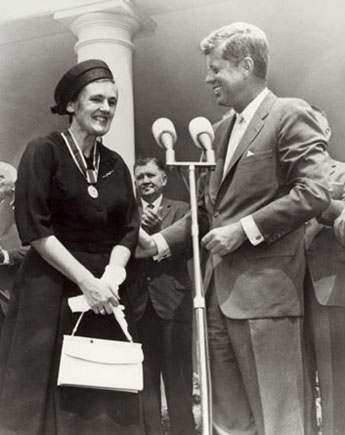 |

|
|
|
FDA medical officer Frances Kelsey receives the President's Distinguished Federal Civilian Service Award from President John F. Kennedy at a White House ceremony in 1962. The award, the highest honor available to civilian government employees, was for Dr. Kelsey's work in blocking U.S. approval of the drug thalidomide in the l960s. It's estimated that more than 10,000 children in 46 countries where the sleep aid had been approved were born with deformities as a consequence their mothers using the drug while the women were pregnant. |
|
|
July 15, 1962:
Thalidomide, a newly developed sleeping pill, is found to have caused birth defects in thousands of babies born in Western Europe. News reports on the role of FDA medical officer Dr. Frances O. Kelsey in keeping the drug off the American market arouse public support for stronger drug regulation.
 |
|
 |
|
This tragedy gave new impetus to a bill intended to enhance drug regulation, the Kefauver-Harris amendments to the Federal Food, Drug, and Cosmetic Act, which became law on Oct. 10, 1962. However, the Kefauver-Harris amendments did not require premarket approval of drugs brought to the market before the passage of the FD&C Act in 1938. Although many pre-1938 drugs have been either taken off the market or have gone through FDA review and approval, it is estimated that several hundred unapproved ingredients are still being marketed in prescription drugs. On June 8, 2006, the FDA announced that, under new guidance on unapproved drugs, the agency is encouraging companies to comply with the drug approval process and seek approval for their |
|
products. "Right now, many unapproved drugs represent a public health threat because consumers wrongly assume that these widely marketed and available drugs are approved and have been found to be safe and effective by the FDA," said Acting FDA Commissioner Dr. Andrew von Eschenbach in announcing the new guidance. "While we want to ensure continued patient access to necessary treatments, as a physician I feel strongly that patients expect and deserve all their prescription medicines to be FDA-approved. These unapproved drugs have bypassed the agency approval process through which FDA ensures, based on reliable scientific data, that marketed drugs are safe, effective, properly manufactured, and accurately labeled." |
|